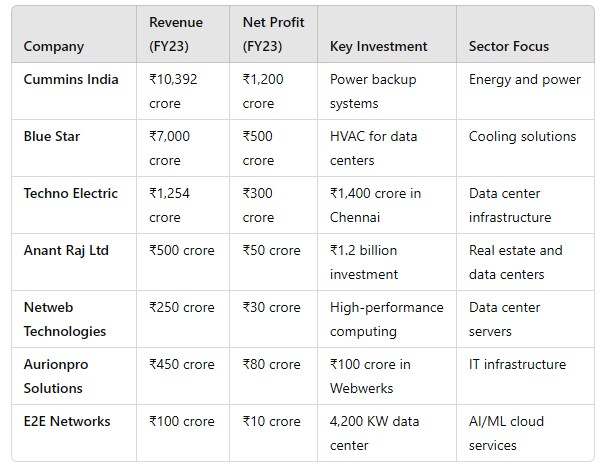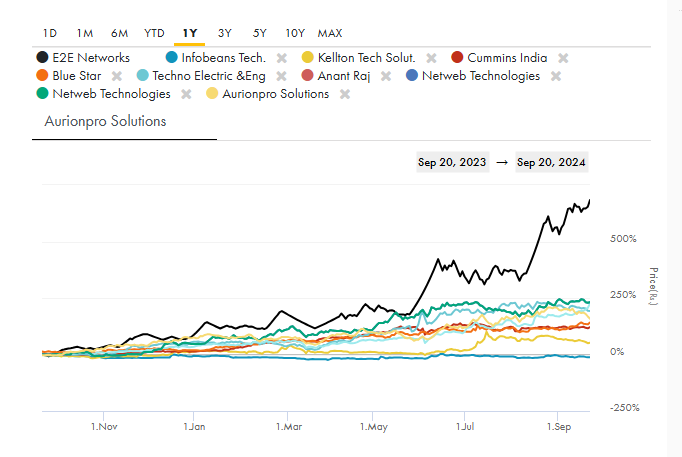Data Centres – Investment Theme by Vivek Bajaj.pdf (7.5 MB)
- Introduction to Data Centres
Data centres are specialized facilities housing IT and communication equipment such as servers, storage devices, and network routers. Their primary function is to offer secure environments for hosting data racks, with adequate power supply and cooling systems to prevent overheating.
- Types of Data Centres
- Captive: Owned and operated by companies for their private use.
- Colocation: Large facilities renting out space to third parties.
- Hyperscalers: Large-scale cloud service providers.
- Edge: Small-sized centres focusing on low-latency, last-mile data processing.
- Global and Indian Data Centre Market
The global data centre market is projected to grow at a CAGR of 10.5%, reaching a market size of $600 billion. India, although contributing 20% of global data, has only a 3% share in data centres, indicating massive growth potential. By 2030, India’s data consumption is expected to exceed that of developed markets, driven by increasing internet usage, 5G adoption, and IoT expansion. - Demand Drivers
- Rising digital technologies and data usage.
- Increasing demand for data storage and management.
- Growth of cloud computing, AI, and IoT.
- Low-cost data in India and the rise of mobile internet users.
- SWOT Analysis for Data Centres in India
- Strengths: Large consumer base, growing mobile internet penetration, increasing 5G rollout.
- Weaknesses: High energy consumption, lack of infrastructure in smaller cities.
- Opportunities: Urbanization, tech adoption, digital initiatives.
- Threats: Competition from global markets, regulatory challenges.
- Key Metrics
- Power Usage Effectiveness (PUE) is a key metric for data centre efficiency, with an ideal PUE of 1.0 indicating no energy waste. India’s average PUE has improved from 2.5 in 2007 to 1.55 in 2022, showing growing energy efficiency.
- Indian Data Centre Landscape
India has an operational capacity of 1,074 MW across 163 data centres as of March 2024, making it the 13th largest data centre market globally. Mumbai and Chennai lead the market due to their strong undersea cable ecosystems, accounting for nearly 60% of the country’s data centre activity. - Companies Involved in Data Centre Infrastructure and Development
- Cummins India
Cummins is a global provider of backup power solutions, particularly for data centres. Its reliable diesel generators are essential for data centres to maintain uninterrupted power supply. Cummins India Ltd. is part of the Cummins Inc. Group USA. - Blue Star
Known for its heating, ventilation, and air conditioning (HVAC) solutions, Blue Star has already worked on projects like the Yotta Data Centre in Noida. The company provides turnkey solutions for mechanical, electrical, and plumbing systems and is the largest after-sales service provider for air conditioning and refrigeration products in India. - Anant Raj Ltd
Engaged in the development of IT parks and SEZs, Anant Raj is converting a commercial property with a potential leasable area of 5.66 million square feet into a 300 MW data centre. The company’s initial 3 MW of this project became operational in Manesar in FY23, with 50 MW more expected soon. - Techno Electric & Engineering Company Ltd (TEECL)
TEECL is developing hyper-density data centres, starting with a 24 MW IT load data centre in Chennai, scheduled to launch in Q3 FY25. The company plans additional centres in Kolkata, Mumbai, and Noida over the next five years. It is also working with RailTel Corporation to deploy edge data centres across 102 cities in India. - Netweb Technologies India (NTI)
NTI is a leading provider of high-end computing solutions. Known for its supercomputers, the company offers data centre servers, AI systems, and private cloud solutions. It caters to clients like IIT Jammu, IIT Kanpur, and Graviton Research Capital LLP. - Aurionpro Solutions Limited
Aurionpro partners with Webwerks to operate Tier 3 data centres in cities like Navi Mumbai, Hyderabad, and Bangalore. The company provides turnkey solutions for data centre design, consultancy, and master planning. It is also planning to develop 100 MW data centres in the coming years. - Black Box
An ICT solutions provider, Black Box offers system integration services in areas like data centres, cybersecurity, and digital solutions. In FY24, the company secured deals worth $105 million for data centre solutions and other significant contracts. - E2E Networks
E2E Networks focuses on AI-centric cloud infrastructure and is expanding its data centre capacity from 1000 KW to 4200 KW over the next seven years. This move will support AI/ML application development and deployment.
- Growth Drivers for Indian Data Centres
- Increasing internet penetration: India’s internet penetration is expected to grow from 50% to 90% by 2030.
- Mobile data consumption: Per capita data usage is projected to reach 62 GB per month by 2028, far surpassing current consumption rates in developed markets.
- Energy and Infrastructure Requirements
Data centres require robust energy supplies and infrastructure for cooling, IT equipment, and electrical management. As the demand for data increases, companies like Cummins, Blue Star, and Anant Raj are essential players in building the necessary infrastructure.
Conclusion
The data centre industry is a critical part of India’s growing digital economy. With increasing internet penetration, mobile data consumption, and the adoption of technologies like 5G, AI, and IoT, the demand for data storage and processing infrastructure will surge. Companies like Cummins, Blue Star, TEECL, and others are well-positioned to benefit from this boom by providing the necessary power, cooling, and computing infrastructure.


| Subscribe To Our Free Newsletter |

